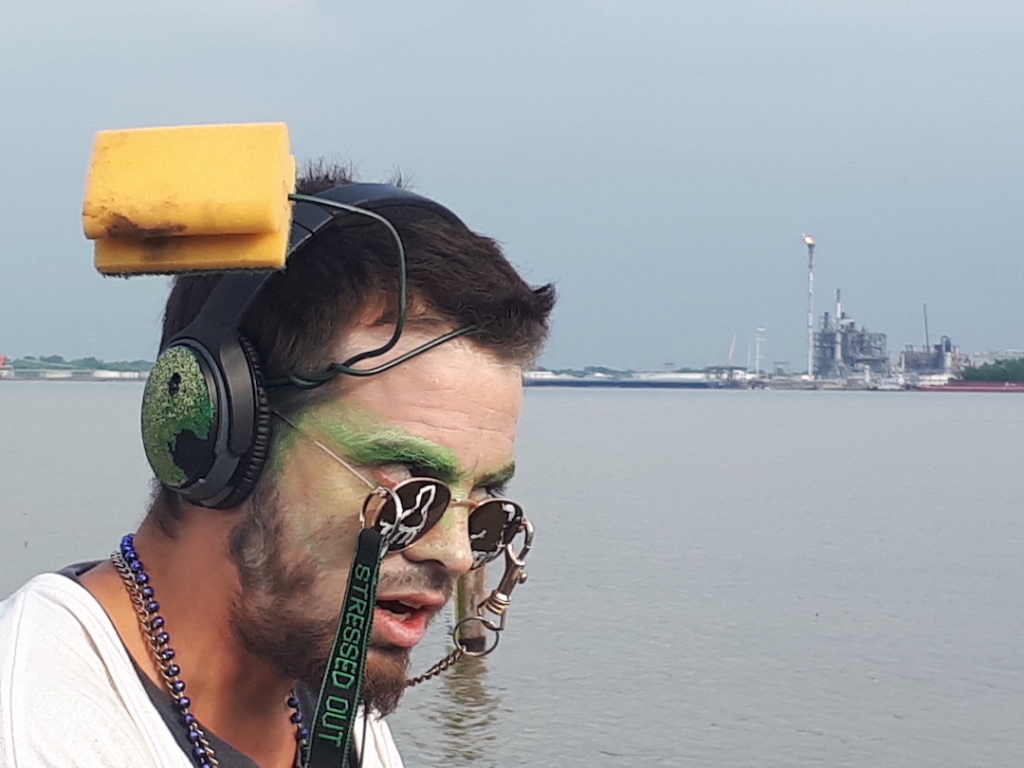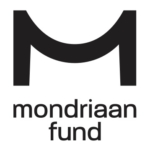Geo Wyex, Nobody Wade Never Too Much
Geo Wyex
in collaboration with Constantina Zavitsanos, S*an D. Henry-Smith, Kamron Hazel, NDNMK Solutions, and Ghaith kween Qoutainy
October 23–December 21, 2024
Opening: Wednesday, October 23, 6–9pm
Performance: Saturday, October 26, 7:30pm doors, 8pm start
 Muck Studies Dept. at the Bonnet Carré Spillway, 2019, performance documentation by Kari Robertson.
Muck Studies Dept. at the Bonnet Carré Spillway, 2019, performance documentation by Kari Robertson.
JOAN presents Nobody Wade Never Too Much, the first institutional solo exhibition in Los Angeles by Rotterdam- and New York-based artist and musician, Geo Wyex. Developed collaboratively with Constantina Zavitsanos, S*an D. Henry-Smith, Kamron Hazel, NDNMK Solutions, and Ghaith kween Qoutainy, this site-specific installation brings together new sculpture, sound, performance, ephemera, and interventions in architectural space as an extension of Wyex’s multi-year project, Muck Studies Dept. (2018–present).
Muck Studies Dept. is an ongoing speculative fiction project and archive—a retelling of the past from an imagined future. It contains many forms and formats, including performance, video, poetry, music, and installation, with research taking place in New Orleans, New York, and the Netherlands. Muck Studies Dept. is also an imaginary municipal agent, surveying the bottom of low-lying water areas, “looking for stars out of what stinks.” Informed by the aesthetics and methodologies of black Atlantic poetics, speculative narrative, investigative journalism, and absurdist theater, the project “touches” on elements such as mud, metals, gas, rocks, coins—that which might be found beneath surfaces, or more precisely, bodies of water—and connects them to what resonates within one’s historical context and lived experience. This includes extractive industry, time travel, historical immanence, and the sensual expression of belonging. The title of this project is taken from “muckraking,” especially so from the legacy of American writer Ida B. Wells, whose investigative journalism exposed the injustices of lynching practices and brought the “muck” of corruption in government and business to the surface. By looking at the tension of what is and isn’t visible, and studying the holes that look out into a deep past that is present, Wyex’s research urgently addresses absences in the historical record and the pitfalls of representation, questioning what visibility does or doesn’t do for those seeking recognition or redress from structures of power.
Nobody Wade Never Too Much centers around Wyex’s new script, based loosely on Irish playwright Samuel Beckett’s 1952 absurdist classic, Waiting for Godot. Organized as a circular conversation between three professors of Muck Study, the text is staged with office chairs turned into sound machines. The characters and related cosmologies reverberate at the edges (i.e. in the “muck”) as they meditate on the failures and possibilities of a shared sense of identity—in the landscape, in the body, between bodies, and beyond the confines of institutional walls. Further ruminating on what political action can look like, and how organizing strategies can be enacted in our contemporary moment, the work performs a deeply inside job: it refuses separation from the conditions of race, class, and gender, but raises the possibility of connection, pleasure, and insurgency in excess of what is made legible or apparent through and by institutional structures. Audio recordings, including Luther Vandross’s 1981 hit “Never Too Much” and the sound of Wyex’s piano being gently dismantled in Rotterdam, intersect with the transmission of the professors’ voices over FM radio signal, moving in and out of both visible and less visible spaces. This convergence allows for a loose constellation of meaning that complicates the boundaries between the audience and the characters, between inside and outside. Wyex invites his audience to wade with him through the sonic, the historical, the embodied, and the shimmering, offering possibilities for new frameworks of study and transmission.
Upcoming Programs and Autograph Press:
On Saturday, October 26 at 7:30pm at JOAN, Wyex will present Nobody Wade Never Too Much, a performance developed with dramaturgical support from artist Will Rawls. The performance is co-presented with ICA LA, and the Scientia Sexualis exhibition curated by Jennifer Doyle and Jeanne Vaccaro, as part of the Getty’s PST ART: Art & Science Collide.
For more info on the performance, see here. Additional programs to be announced.
A poster composed of Wyex’s script and drawings will be available at the gallery. The foldout is designed by The Rodina and produced by JOAN’s Autograph.
This project is part of JOAN’s Chapter Two of programming, which runs from April 2024 through July 2025 and brings together artists and collectives that explore varying communal structures of intervention and support as experiments towards liberatory futures.
Geo Wyex is an artist and educator who works in music, performance, sculpture, poetry, and sound. He often takes the form of various characters in his work, usually outcasts that counter an institutional narrative, and finds poetry in landscapes that are discounted. In doing so, he engages in processes of reclamation, re-envisioning communal experiences and invigorating them. His record, ATM FM, was released through Muck Studies Dept. in 2020. He is currently based between Rotterdam and New York.
Curated by Suzy Halajian
Curatorial assistance from Camila Pernisco
Installation by Ian Page
Creative and installation support from Kamron Hazel
Audio support from “ASMR Conductor & Demolitionist” NDNMK Productions & sound artist/creative consultant Ghaith kween Qoutainy
Voices of the “Professors”: Geo Wyex, Constantina Zavitsanos, and S*an D. Henry-Smith
Production support from Nahui Garcia and Ronald Tailor Shop
Graphic design by The Rodina
Special thanks to Jennifer Doyle and Jeanne Vaccaro
This project is made possible with financial support from the Mondriaan Fund, a Dutch public funding organization focusing on visual and cultural heritage. The performance program is supported by ICA LA.


0